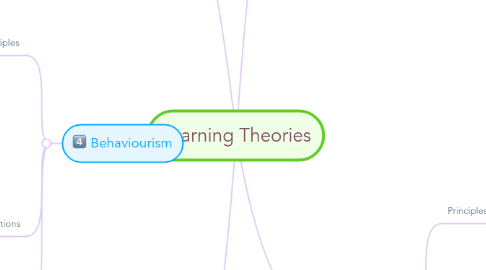
1. Behaviourism
1.1. Principles
1.1.1. All behaviour is learnt form the environment and behaviour is the result of stimulus response.
1.1.2. Behaviourism is observable behaviour
1.1.3. It is believed our mind is born a blank slate ( Tabula Rasa).
1.1.4. We learn through classical conditioning ( based on Pavlov's observations ) stimulus + response = elicit response. Operant conditioning is controlled behaviour due to consequences. Reinforcement and Punishment.
1.2. Implications
1.2.1. Our environment + stimulus reinforces the behaviour.
1.2.2. Students learn best when they practice what being taught.
1.2.3. Repetition is the key to a successful future. Observation improves performance and reinforces the accomplishment.
1.3. Connections
1.3.1. We can apply learned concepts in classrooms to the outside world. Behaviourism is environmental reinforced through society, peers, teachers and more.
2. Information Processing (Cognitivism)
2.1. Principles
2.1.1. Learning happens best under the condition aligned with what the individual already knows.
2.1.2. Memory is structured and helps us learn multiple elements as single element.
2.1.3. Information processing are best retrieved with the help of schemas ( a pattern that organizes and categories information and the relationships among them)
2.2. Implications
2.2.1. The theory can apply to learning such as concept mapping, electronic tools, practice remembering, retrieving information and by organizing information.
2.3. Connections
2.3.1. The theory apply to both educational and pedagogical reasoning. Cognitive Partnership tools can help leaners exceed mental limitations. It can help develop skills that can become transferable to other subject and help benefit other subjects by reducing time spent learning a new concept.
3. Connectivism
3.1. Principles
3.1.1. The process of creating connections and developing a network."
3.1.2. Research and find information through the help of networking.
3.2. Implications
3.2.1. Learning is reinforcement tool and be used as a source engine.
3.2.2. Improves students' collaboration.
3.2.3. Ability to see connections between fields, ideas, and concepts is a core skill
3.3. Connections
3.3.1. Connectivism Theory increases the VLE learning process, both Synchronous and Asynchronous increase partnership of students. Whether it's school related or personal experiences.
3.3.2. It's promote flexible learning because it acknowledge that learning takes place everywhere.
4. Constructivism
4.1. Principles
4.1.1. Teachers present problems while students solve it using basic problem solving skills
4.1.2. Learning that is done through environmental interaction.
4.1.3. Vygotsky's zone of proximal development.
4.1.4. Teachers as facilitator, project based learning
4.2. Implications
4.2.1. Learner is responsible and actively participating to their own knowledge.
4.2.2. Learning by "making"
4.2.3. Learning by discovering and challenging self.
4.2.4. Constructive technologies such as Webquests.
4.3. Connections
4.3.1. People construct their own understanding and knowledge of the world, through experiencing things and reflecting on those experiences. Mind tools helps facilitate knowledge constructively. It helps student be creative and organized. It gives students total control of their learning process by presenting their respective of the world.
5. TPACK
5.1. Principles
5.1.1. A model that integrates teacher's knowledge into consideration in order to affectively teach and engage students with technology.
5.1.1.1. Content knowledge (CK) is the course content knowledge a teacher has in order to conduct a successful classroom. This contains facts, concepts, theories and principles of the course.
5.1.1.2. Pedagogical Knowledge (PK) is what teachers know about teaching. What makes their teaching style unique and in what manner they relate pedagogical knowledge.
5.1.1.3. Technological Knowledge (TK) is a framework to understand teacher's pedagogical knowledge and help describe what pedagogical knowledge the teacher need in order to succeed and enhance technology knowledge in a learning environment.
5.1.1.4. Pedagogical Content Knowledge (PCK) is a teachers' interpretation and transformations of subject-matter knowledge in the context of facilitating student learning.
5.1.1.5. Technological Content Knowledge (TCK) is how technology is used to provide new teaching techniques to enhance knowledge such as digital animation.
5.1.1.6. Technological Pedagogical Knowledge (TPK) is a teachers' understanding of educational technologies. This include knowing the affordance and constraints of technological tools. Example to consider is how whiteboards may be used in classrooms?
5.1.1.7. Technology, Pedagogy, and Content Knowledge (TPCK) is knowledge that emerge beyond all three core components ( content, pedagogy, and technology). It underlines the meaning and skills of teaching with technology.
5.2. Implications
5.2.1. Student centered
5.2.2. Represent technology constructed knowledge
5.2.3. Provides a clear understanding on how to create a successful lesson in order to enhance student's knowledge of the subject or subjects.
5.3. Connections
5.3.1. TPACK can be used as an accessing tool and concept mapping tool. TPACK is not just necessarily used for educational purposes. It can be used for different purpose such as personal interests or work related. TPACK is a personal reflection that helps track knowledge through learning.
